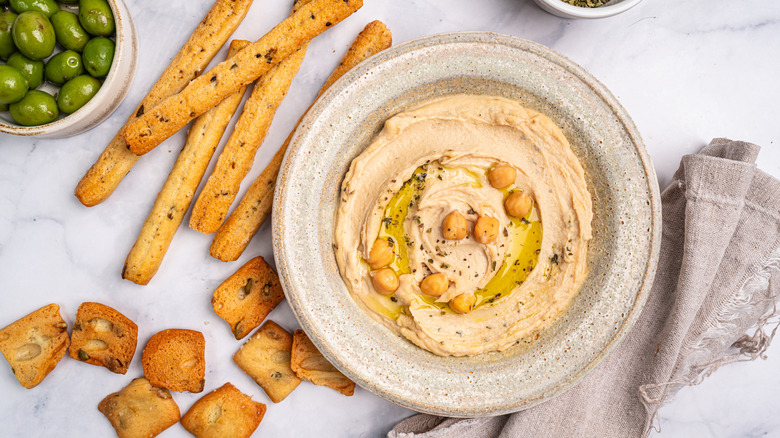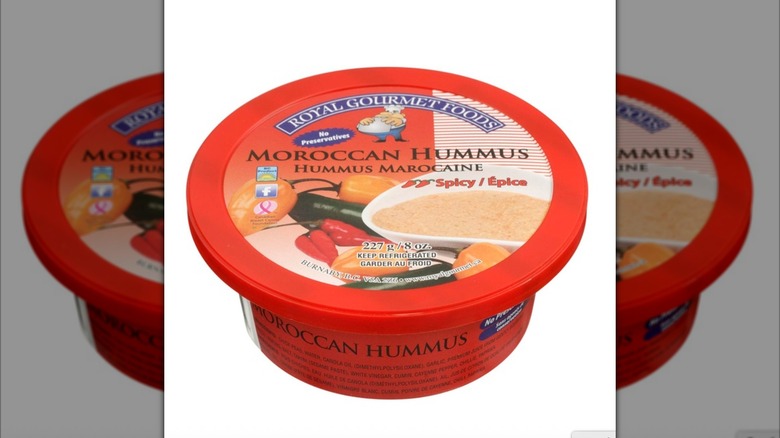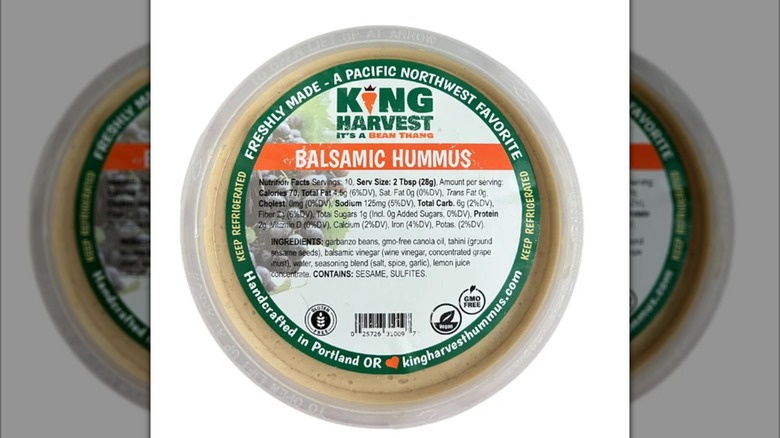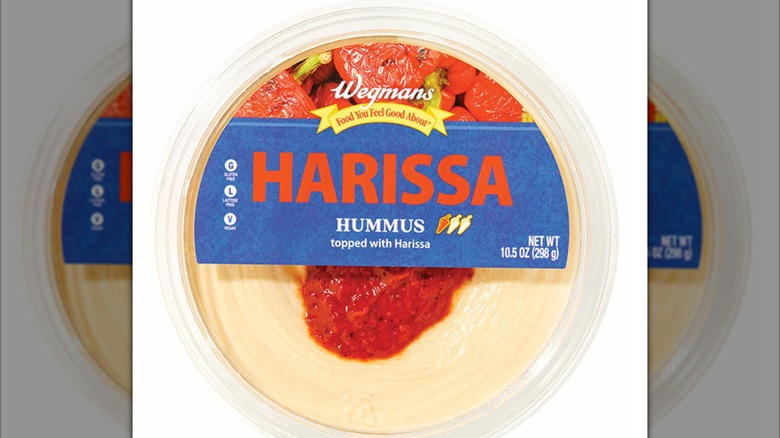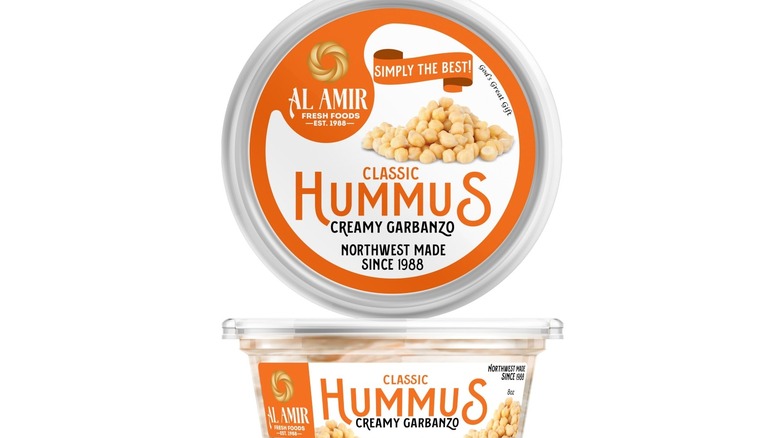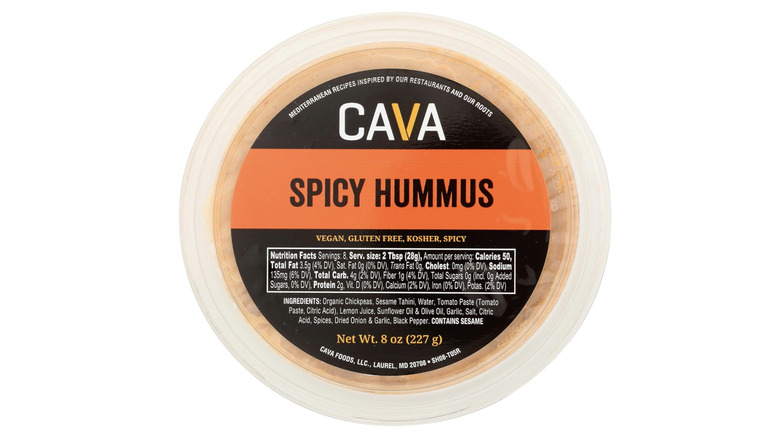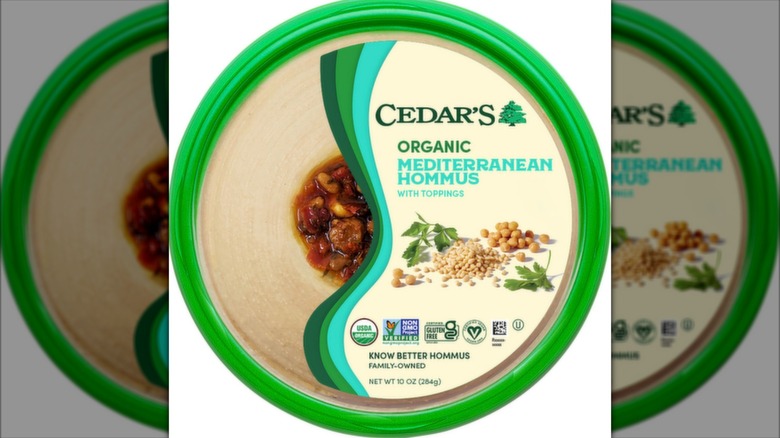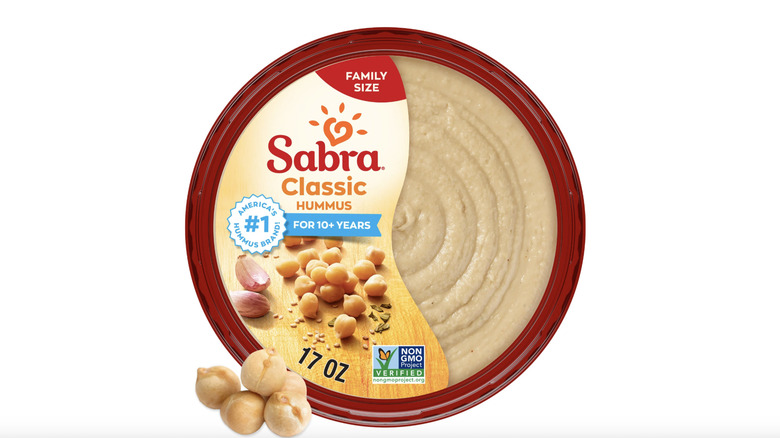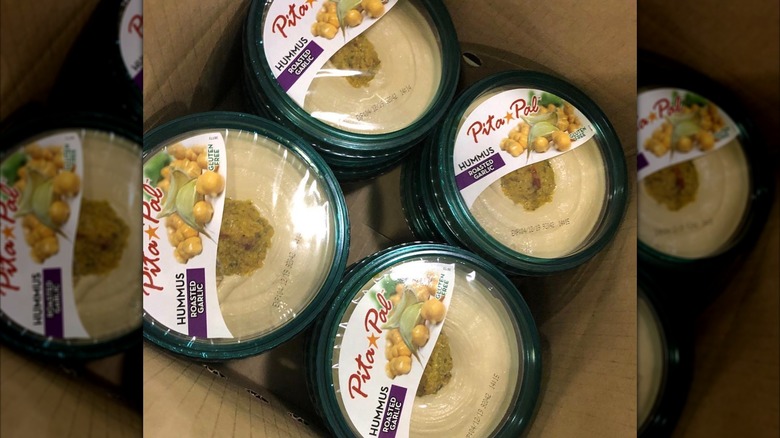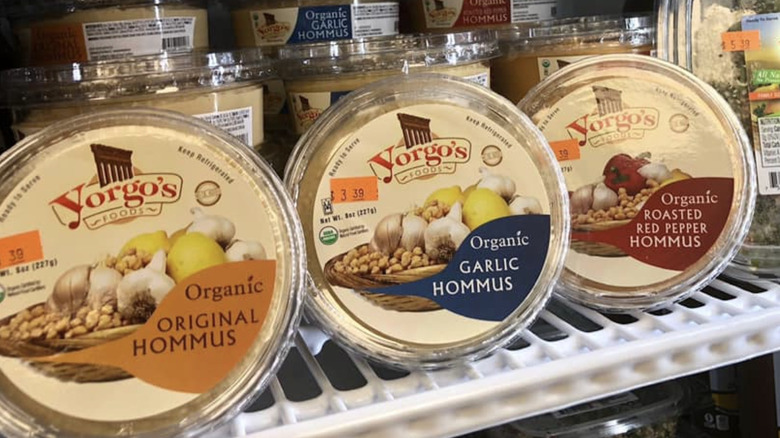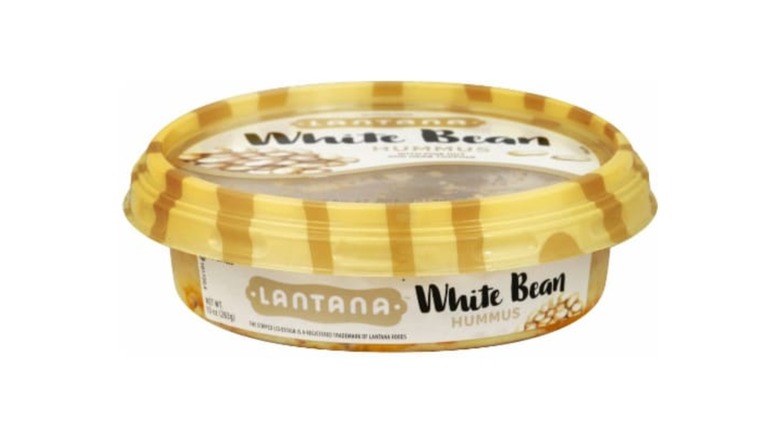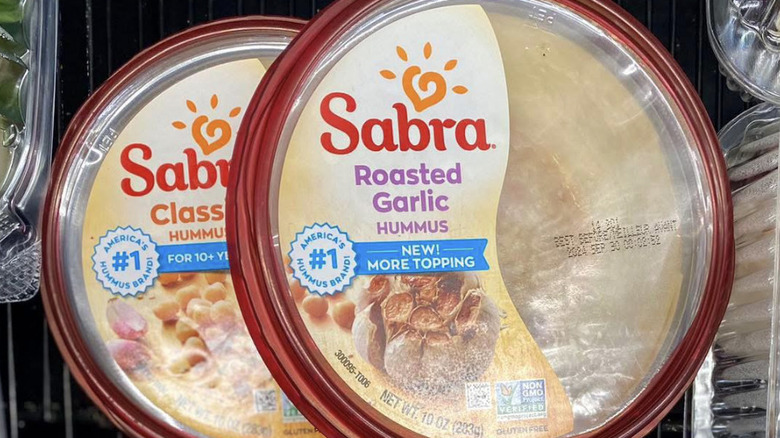Hummus Recalls That Affected Millions
We may receive a commission on purchases made from links.
Creamy and savory with a tangy twist, hummus is a concoction of chickpeas, tahini, garlic, lemon juice, and salt. The ingredients are puréed or mashed into a smooth spread that's both delicious and nutritious — hummus is rich in fiber, iron, protein, phosphorus, and folic acid. A Middle Eastern staple, the term "hummus" translates to "chickpea" in Arabic. While it's unclear where exactly the dip originated, the earliest written recipe for a similar spread appeared in a 13th-century Egyptian cookbook, "Kitab Wasf al-Atima al-Mutada." Although similar to modern hummus, the original version of the condiment called for vinegar and no tahini.
While many claim that nothing beats homemade hummus, the dip is now commercially available in a wide range of flavors. It can also feature an array of colorful toppings. Unfortunately, with a rise in mass production comes increased risks of contamination and labeling errors. As such, it's not surprising that there have been occasions when hummus became the focus of large-scale recalls.
Ready to explore some of the biggest blunders that have affected the hummus industry? From undeclared allergens to potential bacterial contamination, here is a deep dive into some of the most notable hummus recalls in history.
Royal Gourmet Foods and other brands recall hummus products because of undeclared peanuts (2025)
In March and April 2025, several brands of hummus sold across Canada were recalled due to the presence of undeclared peanuts. The first brand to raise the alarm was Habibi's Mediterranean, which recalled its Lebanese-style hummus in Alberta and British Columbia. The presence of peanuts was traced back to the tahini used in the dip.
Shortly after, Royal Gourmet Foods also recalled 18 different types of hummus distributed across Alberta and British Columbia over the presence of undeclared peanuts. These included varieties such as truffle hummus, hummus tapenade, pesto hummus, and Moroccan hummus in containers ranging from 227 grams to 15 kilograms. The blunder was detected during testing by the Canadian Food Inspection Agency.
Within a month of the Royal Gourmet Foods recall, the Pattison Food Group announced that it was recalling its hummus products, also citing the presence of undeclared peanuts. The hummus was sold under a variety of brand names, including Buy-Low Foods, Nesters Market, and Save on Foods. As was the case for Royal Gourmet Foods, the allergen was identified through testing conducted by the Canadian Food Inspection Agency. The products were sold in the Canadian provinces of Alberta, British Columbia, Manitoba, and Saskatchewan, as well as the territory of Yukon.
Pacific Coast Fresh recalls King Harvest Hummus due to plastic fragments (2025)
Pacific Coast Fresh Company distributes a wide range of foods, including fresh fruit and vegetables, dairy, meat, poultry, and seafood. It also supplies groceries, including dips. One of these is King Harvest Hummus, which relies on a combination of simple ingredients and chunky texture to create delicious dips.
Food products can be recalled for a range of reasons, and in the case of Pacific Coast Fresh's hummus, the issue was the possible presence of plastic fragments. In total, the recall involved 12 hummus products, including King Harvest Balsamic Hummus, King Harvest Roasted Red Pepper Hummus, and King Harvest Spinach & Artichoke Hummus. All in all, more than 71,000 containers of hummus were pulled off supermarket shelves in Idaho, Oregon, and Washington in early 2025.
The FDA gave the King Harvest Hummus recall a Class II rating, indicating "a situation in which use of, or exposure to, a violative product may cause temporary or medically reversible adverse health consequences or where the probability of serious adverse health consequences is remote." The recall was announced after a supplier told Pacific Coast Fresh Company about a potential manufacturing defect in the plastic tubs of its hummus.
Summer Fresh Salads recalls Wegmans Harissa Hummus Topped With Harissa due to the presence of undeclared sesame (2024)
Hummus doesn't just come in different flavors; it can also be topped with a range of ingredients to enhance its taste and texture. In 2024, a Wegmans hummus produced by Summer Fresh Salads that came with a harissa topping came under scrutiny after it was discovered that the product's packaging failed to disclose the presence of sesame. The oversight came a year after sesame was added to the FDA's list of major allergens, joining the ranks of fish, milk, eggs, tree nuts, shellfish, peanuts, wheat, and soybeans as ingredients that must be clearly listed on food packaging.
The hummus products were manufactured in Canada and distributed in select Wegmans stores in Washington, D.C., Delaware, Maryland, Massachusetts, New Jersey, New York, North Carolina, Pennsylvania, and Virginia. The hummus came in 10.5-ounce clear plastic containers. While the mishap could have proved fatal to consumers with severe allergies to sesame, no illnesses were linked to the hummus at the time of the recall.
Al Amir Fresh Foods recalls hummus products due to undeclared allergen (2024)
If you think that one undeclared allergen slipping past a food label is a recipe for disaster, imagine what could happen with two in the mix. This is precisely what happened in January 2024 when Al Amir Fresh Foods issued a recall of hummus, baba ganoush, and tzatziki yogurt dips because they contained either sesame or milk that hadn't been listed on the product packaging. When people with intolerances or allergies consume foods containing these ingredients, the consequences can range from mild symptoms and digestive discomfort to life-threatening reactions.
The two hummus products affected by the recall included 8-ounce containers of Classic Hummus Creamy Garbanzo and Harissa Spicy Hummus With a Kick, both of which failed to disclose the fact that tahini contains sesame on the packaging. The clear plastic containers of hummus, baba ganoush, and tzatziki were sold in stores in Oregon and Washington.
Cava Foods recalls Cava Spicy Hummus due to undeclared sesame (2023)
Vegan, gluten-free, and kosher, Cava Foods' Cava Spicy Hummus brings a satisfying kick to the classic chickpea-based dip that has long been a staple of Mediterranean and Middle Eastern cuisine. The source of that heat is harissa, a North African chili paste made with red peppers, olive oil, citrus, garlic, tomato paste, and spices like cumin, cayenne pepper, and smoked paprika.
In 2023, Cava Foods announced that it was pulling its Cava Spicy Hummus off supermarket shelves due to the omission of sesame in the ingredient list. The recall was issued after a retail store notified Cava Foods that it had mistakenly labeled its 8-ounce containers of Cava Spicy Hummus, which contains sesame, as Cava Spicy Labneh, which doesn't contain sesame and therefore doesn't list it as one of its ingredients. The hummus had been distributed to Giant Foods, Mom's Organic Market, Whole Foods Market, and independent retailers across the U.S. No adverse health effects were reported after eating the product at the time of the recall.
Cedar's Foods recalls Cedar's Organic Mediterranean Hommus due to undeclared pine nuts (2021)
If you think Cedar's Foods made a labeling error by using the word "hommus" on its packaging, think again. Rather than using the standard spelling of hummus, Cedar's Foods has deliberately branded its product hommus to honor the spelling traditionally used in its founder's Lebanese heritage. Launched in 1981 with a family-inspired recipe, today Cedar's Foods offers a range of hummus products, including Cedar's Organic Roasted Red Pepper Hommus and Cedar's Topped Organic Hot Honey Hommus.
Unfortunately, in 2021, Cedar's Foods had to recall its Cedar's Organic Mediterranean Hommus due to undisclosed pine nuts, which fall under the allergen category of tree nuts. More specifically, the product was mistakenly labeled with the packaging intended for Cedar's Organic Everything Hommus, which doesn't contain pine nuts. As Cedar's Foods informed the FDA in an email, the potentially costly error happened after "an employee failed to follow the label change over procedure and performed an unauthorized label change." The tainted hummus was distributed in more than 20 states.
Sabra Dipping Company recalls Classic Hummus due to salmonella contamination (2021)
Founded in 1986, Sabra Dipping Company specializes in crafting dips, spreads, and ready-to-go snacks. The company's hummus products are made with chickpeas sourced from small, family-operated farms in the Pacific Northwest. Despite its perceived commitment to quality, in 2021, the FDA and the Virginia Department of Agriculture and Consumer Services discovered traces of salmonella bacteria in a sample of Sabra hummus during routine testing. The specific product line in question involved 10-ounce containers of Sabra Classic Hummus, which were distributed in 16 states. All in all, the company recalled 16,200 pounds, or 25,920 tubs, of the spread.
The Sabra hummus was allocated a Class I rating, the most serious designation, defined by the FDA as "a situation in which there is a reasonable probability that the use of or exposure to a violative product will cause serious adverse health consequences or death." Following the recall, an inspection of the Sabra production facility in Virginia revealed serious violations, including hummus products contaminated with both salmonella and listeria bacteria.
The onset of a salmonella infection usually takes place within 12 to 72 hours of exposure to the contaminated food product. Some of the typical symptoms associated with salmonella include diarrhea, abdominal cramps, and fever. While most individuals improve without medical care, in some isolated cases, the infection can become serious enough to warrant hospitalization.
Pita Pal Foods recalls hummus products due to possible listeria contamination (2019)
The Pita Pal Foods hummus recall of 2019 involved a huge range of products. In fact, the company ended up recalling close to 90 different varieties and flavors of the dip. These were sold under multiple brand names, including Pita Pal, Lantana, Reasor's, Roundy's, Schnucks, Harris Teeter, and 7-Select. The affected products spanned numerous flavor profiles, ranging from olive to pine nut to roasted red pepper.
Pita Pal Foods issued the nationwide hummus recall after an FDA inspection found listeria at its manufacturing facility. While listeria bacteria were never detected in the actual products, the company announced the recall just to be safe. While there were no reported illnesses at the time, listeria can be particularly serious if contracted by the elderly, young children, or individuals with a compromised immune system. The infection typically manifests in symptoms such as diarrhea, abdominal pain, nausea, high fever, and severe headaches.
Yorgo's Foods recalls various hummus flavors due to potential listeria contamination (2017)
Yorgo's Foods was a Mediterranean-inspired brand focused on organic and all-natural products, offering hummus, pita chips, taboule, and bean salads. While it looks like Yorgo's Foods is no longer in business, it's unclear whether this listeria-related product recall contributed to its demise. The recall in question took place in 2017 after the FDA discovered listeria at Yorgo's production facilities and in one batch of its Original Tahini Sauce.
While the recall initially only affected hummus and baba ganoush products, it was later expanded to all Greek-style food products manufactured by the company. In total, more than 40 different food items were pulled off grocery store shelves across the U.S. Among them were Original Hommus, Roasted Red Pepper Hommus, Sundried Tomato Hommus, and Lemon Pepper Hommus. Two Trader Joe's-branded products were also affected by the recall — Trader Joe's Cilantro & Chive Yogurt Dip and Trader Joe's Tahini Sauce.
House of Thaller recalls pine nut hummus products due to possible contamination with listeria (2017)
Founded in 1964, House of Thaller is a third-generation, family-owned refrigerated foods business. The company specializes in manufacturing ready-to-eat products — including dips, hummus, pimento cheese, and deli salads — for private label brands such as Food City Premium, Eat Well Embrace Life, Palmetto Farms, Harris Teeter, and Archer Farms.
In 2017, House of Thaller issued a recall of three products due to concerns over possible listeria contamination. These included Fresh Foods Market Artisan Hummus, Lantana White Bean Hummus, and Marketside Classic Hummus, all of which came with a topping of pine nuts, a popular choice for upgrading plain hummus. The three spreads were sold across the U.S. and in Canada. House of Thaller withdrew the products from the market after HVF — the company's supplier of roasted pine nuts used as a hummus topping — raised the alarm about potential contamination. Fortunately, no cases of illness were linked to House of Thaller's hummus products at the time of the recall.
Sabra Dipping Company recalls hummus products due to fears over listeria contamination (2015 and 2016)
The Sabra Dipping Company issued recalls for several of its hummus products due to the potential presence of listeria in both 2015 and 2016. Its 2015 listeria recall took place in April when the company pulled 30,000 cases of Sabra Classic Hummus. The move was initiated after routine testing at a Kroger outlet in Port Huron, Michigan, found traces of listeria in the product. The hummus had been distributed to retailers nationwide but caused no reported illnesses at the time.
The story repeated itself in November 2016 when the Sabra Dipping Company announced a recall of 57 different products, including hummus, due to possible contamination with listeria. The pathogen was discovered at the company's manufacturing facility, but wasn't present in any of the tested products. The only products not affected by the recall were Sabra Organic Hummus, Sabra Salsa, Sabra Guacamole, and Sabra Greek Yogurt Dips. Although no cases of illness were linked to the products, Sabra issued a recall out of precaution.
